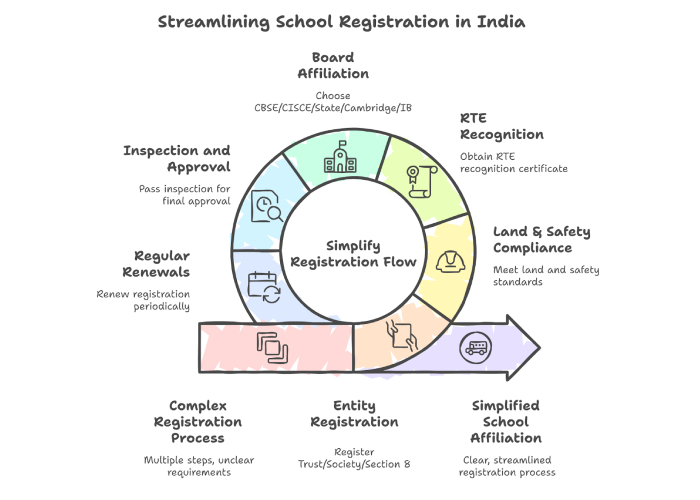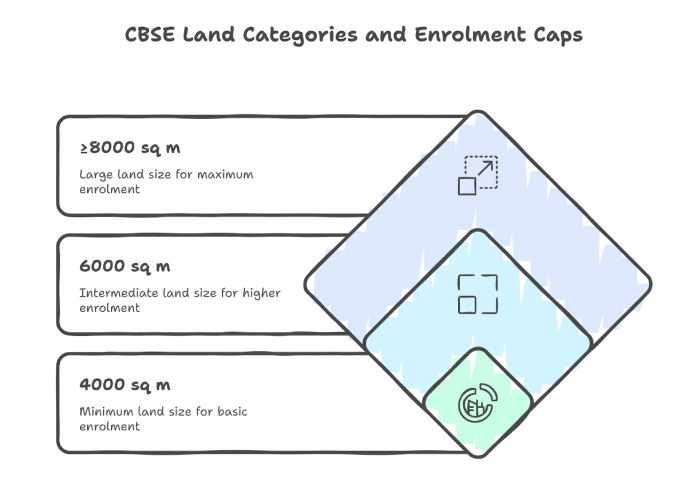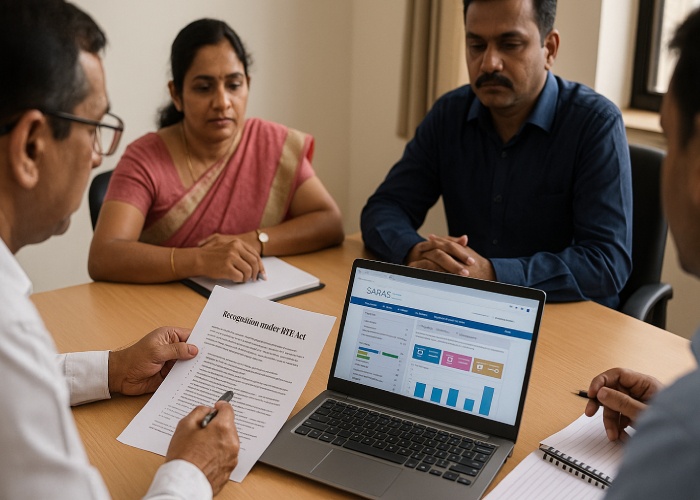How To Register A School In India: Board-Wise Steps For 2025
- Home
- /
- How To Register A School In India: Board-Wise Steps For 2025
Starting a school is equal parts dream and due diligence. Suppose you are asking, “How To Register A School In India?”. In that case, the simple answer is to secure legal status, meet Right to Education recognition norms and finally pursue the board affiliation or authorisation that matches your vision.
Keep in mind the order matters, the paperwork matters, and the way you plan teaching and safety systems matters even more. NatureNurture’s guide below keeps the process clear, board by board, so you can plan with confidence.
Who this Helps, and the Typical Roadblocks
You are a school owner or principal planning a new K-12 campus, or formalising an existing venture. Your questions cluster around legal entity type, land norms, RTE recognition, the CBSE Affiliation Process, ICSE requirements, and what Cambridge or IB expect during inspections. Timelines, fees, teacher qualifications, and safety certificates are sitting on your desk. Our goal is to make each step workable.
First Principles: Register the Entity, then Secure Recognition
Before any board will look at you, the law requires a recognised school. Create a non-profit legal entity as a Trust, Society, or Section 8 Company. CBSE’s affiliation bye-laws emphasise a non-proprietary character. Apply for a certificate of recognition from your state education authority under Section 18 of the RTE Act. No private school can be established or function without this recognition. Keep state-specific Rules handy, as most use the Model RTE forms for recognition certificates.

Board-by-Board Requirements and Routes
CBSE: SARAS 6.0, bye-laws, and land norms
CBSE applications run on the online SARAS portal. Start by studying the Affiliation Bye-Laws and the SARAS manual. CBSE periodically opens application windows via circulars follow the session timelines and mandatory document list on the portal. Land norms are outlined in Chapter 3 of the bye-laws, with categories that include 8,000 sq m. Relaxations exist for certain cities and contexts, allowing for a minimum of 4,000 sq m, subject to enrollment caps and other conditions. Expect inspection against safety, staff, CBSE Verification Process, and infrastructure. Teacher qualifications must align with the national norms.

Quick CBSE checklist
-
Create Trust/Society/Section 8 documents and upload them to SARAS Portal.
-
Ensure state recognition under RTE, and state NOC where applicable per circulars/bye-laws.
-
Verify land category against Chapter 3 tables and plan enrollment/sections accordingly.
-
Prepare safety, sanitation, and building certificates for inspection.
CISCE (ICSE/ISC): e-Affiliation with mandatory State NOC
CISCE requires a state No-Objection Certificate (NOC) for affiliation, along with a prescribed Certificate of Land, registration papers of the managing Trust/Society/Section 8, and proof of staff qualifications. Applications are filed through CISCE’s e-affiliation portal, so study the Council’s affiliation guidelines before you apply. Permanent affiliation is considered after your first ICSE batch is registered within five years of provisional affiliation.
Quick CISCE Checklist
-
Obtain State NOC naming classes sought for affiliation.
-
Get the Land Certificate in CISCE format signed by the competent authority.
-
Ensure English medium, prescribed scheme of studies, labs, and a well-equipped library.
State Boards: Recognise per RTE, then follow state rules
If you intend to run a State Board, complete RTE recognition first. States notify detailed processes, formats, and renewal conditions. For example, Delhi’s Directorate of Education runs a dedicated recognition module similar processes to this exist across states under their RTE Rules. Watch for circulars that govern quotas, norms, and compliance reviews.
Cambridge International: Registration, Application, and Approval Visit
To become a Cambridge International School, first express interest, then submit an application detailing curriculum plans, staff, and facilities. Cambridge conducts an approval visit and supports you through onboarding after approval. The India page outlines how the Cambridge Pathway fits local contexts and also follows global registration guidance alongside state recognition requirements.
International Baccalaureate (IB): Candidacy to Authorisation, with Fees
IB schools progress through candidacy to authorisation, supported by programme specialists. Fee structures include application and annual fees for authorised schools. Plan budgets across programme evaluation cycles, too. Always read the current Asia-Pacific guidance to align staffing, governance, and pedagogy during the authorisation journey.

The seven-step School Registration Process most promoters follow
1) Choose the legal structure and governance
Register a Trust, Society, or Section 8 Company with clear non-profit objectives in education. Draft transparent governance and finance policies acceptable to boards and auditors. This aligns with the non-proprietary expectations found in national bye-laws.
2) Secure land, building plans, and safety design
Map your city category to land norms if you plan for CBSE, review their expectations for labs and library spaces. Design for natural light, barrier-free access, and evacuation plans to line up structural stability, fire safety, and sanitation certificates before inspection.
3) Obtain RTE recognition from your State/UT
Apply to the district education authority using the prescribed forms and keep grant conditions and renewal dates visible in your compliance calendar. Without this, no private school may function legally.
4) Staff recruitment and HR documentation
Hire heads and teachers who meet board-accepted qualifications. Capture appointment letters, service books, and staff training logs. Build your School Management Consultancy playbook for induction, Teacher Training, and appraisal aligned to programme needs.

5) Build academic and assessment systems
Document your curriculum plan, timetables, lab schedules, child protection policy, and assessment framework. For CBSE, read the SARAS manual and FAQs to align documentation, and for CISCE, ensure English medium and syllabus alignment.
6) File the board application and host inspection
Submit accurate data, maps, and certificates. Keep originals ready for the inspection team, including land/title, building safety, fire, sanitation, and School Lab Setup lists. Maintain a visitor file that shows governance minutes and finance transparency.
7) Post-approval compliance and renewals
Track affiliation validity, pay annual fees where applicable, and file updates when you increase sections or introduce additional subjects. For IB, plan for periodic evaluations.
For all boards and keep safety certificates current.
Costs, timelines, and risk flags
Timelines vary by board cycles, portal windows, and your build readiness. Key cost heads include land and construction, safety systems, labs, application and inspection fees, and staff onboarding. Mis-sequencing steps, under-documented land titles, or missing RTE recognition are the most common reasons inspections stall. Use a School Affiliation Consultant only to supplement your team. The ultimate accountability stays with your governing body.
Why choose NatureNurture
NatureNurture partners with Indian schools as a long-term School Curriculum Provider, aligning pedagogy, teacher development, and quality assurance while you progress through registration and affiliation. We help plan evidence-ready academic systems, set up training that boards expect to see, and document processes that make inspections smoother. The result is a compliant school with a living curriculum, not a stack of files.
If you want a steady hand through recognition, affiliation, and academic setup, talk to our school registration team. We will help you align documents, pedagogy, and operations for a board-ready launch.
©2025 NatureNurture

